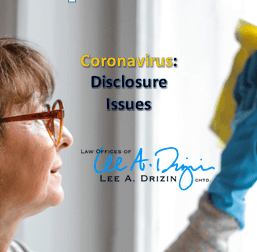The Need to Review and Revise Your Estate Plan – Part 2
Learn about important changes in the law that warrant everyone to consider revising their estate plan.
VIDEO TRANSCRIPT
Lee Drizin: Hi, everyone, this is Atty. Lee Drizin, and this is part two of the Importance of Periodic Review and Reasons to Update Your Estate Plan. In part one, we talked about the fact that since the time you’ve executed your plan, life moves on and things change. A couple of other things that we’re going to talk about today are significant changes that warrant the review of your estate plan.
Change in marital status
In the event of a divorce, estate planning documents are not invalidated in their entirety. However, to the extent that you’ve made nominations, which include a former spouse, or provided for a distribution to a former spouse, those become void. Now, it is still a good idea, even though the entire document has become invalid to execute and update new plans, particularly, if you’ve gotten married, since the time you executed your original plan. In other words, if you have a plan that existed prior to marriage, and you don’t update that, that plan is nullified to the extent you haven’t provided for your new spouse.
Really simple. This is an example of people being pennywise and pound-foolish. It is worth it in these types of events to revise your estate plan. There are a host of issues that your spouse may face if he or she doesn’t have the authority to make decisions regarding your healthcare, or your finances in the event of incapacity.
One of the worst scenarios is that he or she is required to pursue guardianship. It is an expensive and time consuming process, and the types of documents that would avoid guardianship are durable powers of attorney for healthcare and durable powers of attorney for financial decisions. These are inexpensive, easy and straightforward documents for us to assist you in incorporating into your estate plan, and absolutely should be updated.
Children from prior marriage and/or stepchildren
You may want to consider the change of ensuring that children from a former marriage are included. In other words, if you have an estate plan that leaves everything to your spouse, and you have children from a prior marriage, that spouse may be able to change the estate plan after your passing to exclude those kids. If you want to ensure that children from a prior marriage are being included, then it warrants a change to the plan.
Alternatively, you should be aware of the fact that if you have a plan that provides that upon your passing, that your estate passes to children in the event your spouse has predeceased you, that does not include stepchildren. If you have married, since you entered into, or executed your estate plan, and you want to include stepchildren, another reason to update your documents.
Disposition of remains/funeral arrangements
There may be desires regarding the disposition of your remains or a funeral plan that you now want to revise or include in documents that omitted these types of issues. For example, you may have decided that you now want to be cremated. That’s something that we should put in your plan. If you’ve got information about cremation expressed in your will, but now you have particular desires of how you want the ashes to be distributed, again, that is something that should be included in the estate plan. Prior plans, more often than not, may have omitted funeral arrangements all together, because it seemed like an event that was just too remote.
Now the more that you’ve thought about it, and time has changed, you have some very specific desires that you want followed. Those types of funeral arrangements should be reflected in your plan.
To infinity and beyond
For those who are Star Trek fans, remember Gene Roddenberry who created Star Trek. He had asked to have his ashes scattered in space, and that request was fulfilled in April of 1997, when his ashes and those of 27 other people, were launched into space by a Pegasus rocket. Now, your funeral arrangements may not be quite as exotic as those, but nevertheless, those are important personal decisions, and if they’re not reflected in your estate planning documents, it’s time to include them in there.
Changes in nominations
One of the biggest things that we see happen with clients needing to update documents relates to changes and nominations. You need to ask yourself, have the persons that you nominated to serve as trustee, to serve as personal representative, or the attorney-in-fact under your health care, or financial powers of attorney, are they still willing to serve? Is it appropriate for them to serve? They may have passed away, there may have been a falling out. They may no longer be accessible, and someone who you think is willing to accept the nomination. So it’s time to think about those types of questions of whether updates are appropriate.
Entrusting adult children
In many instances, we’ve had clients that had teenage children who they weren’t comfortable with, obviously, having an 19-year old serve in a fiduciary capacity. But now years later, they’re adults, and they have the maturity, and they would prefer the children to serve in those roles, as opposed to a sibling.
- Are the persons that you’ve nominated for guardian of children still appropriate?
- Still willing?
- Are they still the people that you want to serve as a guardian of a child in the event of your untimely demise?
- Do you desire to include additional alternate nominations? For example, in most estate planning documents, a spouse has nominated the other spouse, and then there’s an alternate. You can add additional alternates.
- Are your alternates alive?
- Are they still someone that you think is appropriate to serve, whether it’s for the position of trustee, guardian, personal representative, or attorney-in-fact?
20/20 hindsight
Consider whether co-nominations still make sense. We see this a lot where parents have been concerned that they don’t want there to be hard feelings between one of the kids and another one, and so they’ll nominate co-persons to serve as trustee or healthcare agents. You have to ask yourself, do you believe that the two of them will work through any differences that they have? Because what is appropriate is that they act in your best interest, and that they follow your wishes. If they can’t do that, then it may be appropriate to revise the documents to eliminate co-nominations.
Changes in the law
Last but not least, laws change. In 2019, we saw some of the most significant changes that will impact our clients estate plans. Due to the increase, for example, in federal estate tax exemption, A/B trust may no longer make sense now. The federal estate tax exemption didn’t just change in 2019, it’s been significantly increased over the last eight years. However, it is something now for clients to- if they haven’t already think about it today, if that warrants the elimination of these kinds of provisions that could otherwise result in significant fees and more difficulties, or make it more complex in the administration of your trust estate.
However, one of the things that we did see change here in Nevada in 2019 relates to the disposition of tangible personal property through the use of a memorandum. And we’ll talk about this in more detail on one of our other videos.
Changes in durable powers of attorney
New laws have come out regarding durable powers of attorney for financial decisions, and durable powers of attorney for health care decisions. We are making recommendations that all of our clients execute new healthcare and financial powers of attorney. Also, as technology has evolved, we are developing language that we think should be included in our clients estate plans, for example, digital assets. There’s been litigation over the ability for family members upon the loss of a loved one to be able to access Google accounts, social media accounts, and online banking. So we have new laws that refer to these digital assets, and this type of language should be included in your estate plan.
That’s an overview of the kinds of factors that you should be thinking about with the change of your estate plan. If you have questions, you can reach out to us by email, by telephone, or you can download one of our ebooks about estate planning, probate or divorce. In the meantime, be safe and take care.
For more than 30 years, Attorney Lee A. Drizin has practiced in the areas of estate planning, probate, trusts, guardianship and real estate matters representing clients throughout the state of Nevada.
Drizin Law is providing this information for educational purposes only. It should not be construed as legal advice or a legal opinion as to any specific facts or circumstances. This information is based on general principles of Nevada law at the time it was created and you should be aware laws frequently change. Moreover, the laws affecting you may differ depending on the circumstances. You should consult with a qualified attorney in your own state or jurisdiction concerning your particular situation. Review of this information does not create an attorney-client relationship.







